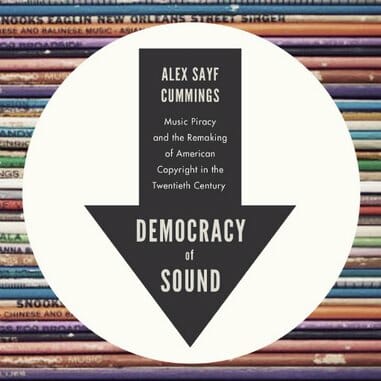Democracy of Sound by Alex Cummings
Incomplete … and subject to change

In Democracy Of Sound, author Alex Cummings identifies a man who may be the first individual to pirate music—the awkwardly named Wynant Van Zant Pearce Bradley. Mr. Van Zant Pearce Bradley sold phonographs that “bore the names of. . . noted composers apparently without permission” and also did some copying of “arias. . . licensed to Columbia Records” in the early 1900s.
Aside from the magnificent moniker of the perpetrator, what’s the significance of this small blip in the history of the laws that have surrounded music and recording in America? Well, for one thing, it shows that people have been messing around with sound and sound-producing technology—in ways that upset other people—for more than 100 years … basically since music and music technology entered the modern era.
There’s another episode from the early struggles over copyright law that may sound startlingly modern to readers. A representative for the Victor company (one of the major phonograph producers) told Congress that after his company did all the hard work, “‘It is perfectly possible. . . for that record. . . to be reproduced by. . . somebody else and copied. . . We would pay the thousand dollars or so and have no protection.’” And John Phillip Sousa, a famous conductor who associated his name only with specific recordings, felt that unauthorized reproductions were detrimental to his work: “‘I can compose better if I get a thousand dollars than I can for six hundred.’”
As Cummings succinctly summarizes, “Money talks.”
Reproduction upset people about a hundred years ago, and corporations wanted their profits protected. How much has really changed?
Well. . . a few things. Cummings charts the ebb and flow of copyright law, “always incomplete, always subject to change,” across the century. Back in 1909, the owner of a song “could choose to license the first mechanical use of a composition, but any subsequent renditions were beyond the copyright holder’s control.” Initially the law focused on the devices that played recordings, rather than on the actual recordings. Music differs from many art forms, since it can be written as well as heard, and this caused a headache for lawmakers.
As technology changed, so did the challenges of figuring out copyright. Before the second World War, the legal system “reflected a Progressive Era predilection for limiting the control of information.” Copyright evoked the danger of market monopolies. The famous Supreme Court Justice Louis Brandeis noted, “‘recognition by courts of a new private right may work serious injury to the general public, unless the boundaries of the right are definitely established and wisely guarded.’”
After World War II, magnetic tape technology infiltrated recording—making it easier than ever for someone to record a performance—and in the 60s, piracy became closely intertwined with the rise of rock ‘n roll and the counterculture. Previously, many music pirates were jazz fanatics trying to keep old recordings (often neglected by record companies) in circulation. Reproduction of recordings and the taping and disseminating of live shows then moved from the fringes to the center of the pop world. This practice got lumped in with other habits of ‘60s youth, like occupying administration buildings, speaking out against war or capitalism and smoking pot.
Then the backlash came. First the states acted—New York passed an anti-piracy law in 1966, California in 1968 (both of these states had big recording industries). Five more states followed in 1971. National reform came not long after, and the record companies didn’t have many outspoken opponents. A few senators “supported the idea of compulsory licensing as a way to limit the record companies’ power, and questioned whether the label should be treated as an author” of musical compositions. But in the end, “copyright law recognized the label’s role in creating the record as much as, if not more than that of a singer, songwriter, or musician.” President Nixon signed the bill on October 15, 1971.